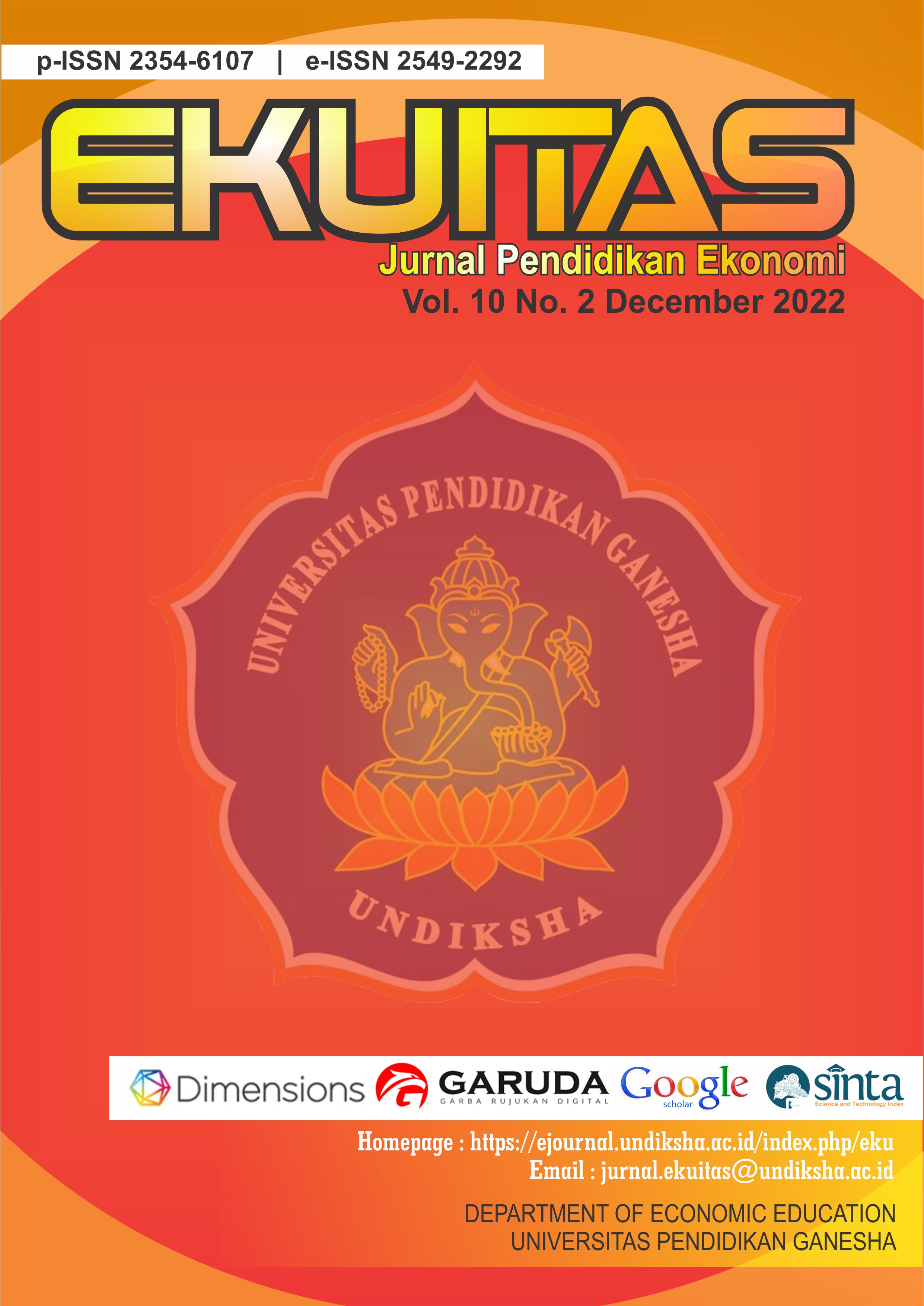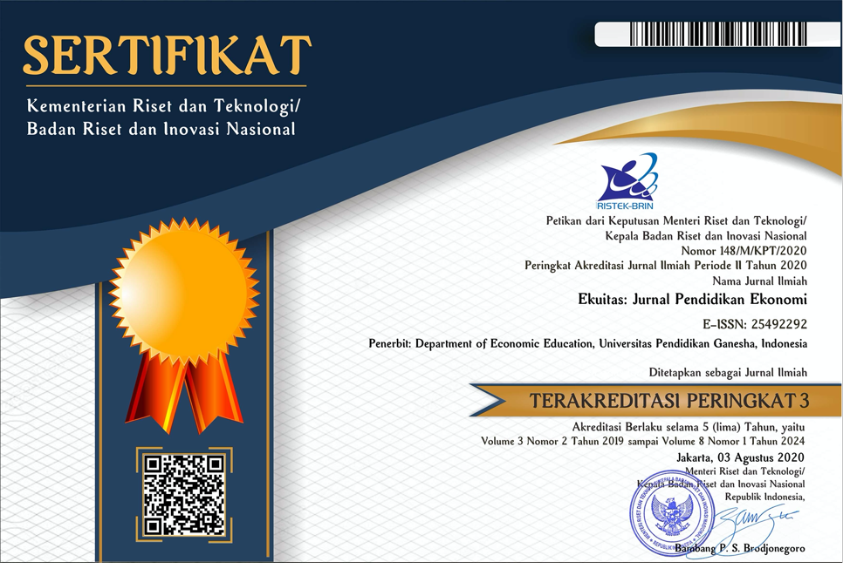Kualitas Teknologi Layanan Mandiri Aplikasi KAI Access (Studi Pada PT. Kereta Api Indonesia Persero Daop 9 Jember)
DOI:
https://doi.org/10.23887/ekuitas.v10i2.54345Keywords:
KAI access application, service quality, self-serviceAbstract
After the Covid-19 pandemic, the service business moved more rapidly, this led to increased competition between service providers. One of them is transportation services. As a land transportation service provider, PT Kereta Api Indonesia (Persero) is an Indonesian state-owned company engaged in rail transportation services. One of the effects of the social distancing movement implemented by the government is that people are now more comfortable with independent services. The KAI Access application which has been developed and published since 2014 is one of the facilities of PT. KAI (Persero) which is able to fulfill digital-based services by providing independent access to prospective passengers and their passengers. Facilities obtained from the KAI Access application include ticket reservations, ticket schedule changes, ticket cancellations, KRL information, KAI Logistics, top up and billing, to taxi and bus ordering facilities. This study aims to describe the quality of self-service technology services provided by the KAI Access application owned by PT. KAI (Persero) at DAOP 9 Jember. This research uses descriptive qualitative research as its research method. The quality of self-service technology services from the KAI Access application at PT KAI (Persero) is the focus of this study. According to Parasuraman et al., service quality testing at PT. KAI (Persero) DAOP 9 Jember uses five dimensions of service quality, namely tangibles, reliability, responsiveness, assurance, and empathy. The results of the analysis of the service quality of the KAI Access application in this study concluded that the service quality of the KAI Access application at PT. KAI (Persero) can be said to be good. According to Parasuraman et al., there are five indicators of service quality, one of which is the Direct Evidence (Tangibles) indicator in the PT KAI access application service. (Persero) quite well. The people who use the KAI Access application service are used to using this technology. The Jember station continues to pay attention to officers who specifically assist the operation of the KAI Access application by providing customer service in train cars and at the station.
References
Al-Bourini, F. A., Aljawarneh, N. M., Almaaitah, M. F., Altahat, S., Alomari, Z. S., & Sokiyna, M. (2021). The role of E-Word of mouth in the relationship between online destination image, E-satisfaction, E-Trust & E-Service quality for international tourists perception. Journal of Information Technology Management, 13, 92–111. https://doi.org/10.22059/jitm.2021.80756
Bramasta, D. B. (2022). Cara Pesan Tiket Kereta Api via Website dan KAI Access. Kompas.Com. https://www.kompas.com/tren/read/2022/08/25/080400665/cara-pesan-tiket-kereta-api-via-website-dan-kai-access?page=all
Defi Maya Oktasari. (2015). Adriamycin-induced delayed erythropoietic injury expressed following anemia stress. Cancer Research, 3(2), 1339–1353. https://ejournal.ip.fisip-unmul.ac.id/site/wp-content/uploads/2015/09/JURNAL DEFI (09-08-15-10-07-16).pdf
Fithriana, N., & Silmia, S. (2020). Inovasi Layanan Cetak Tiket Mandiri Untuk Menunjang Kualitas Pelayanan Publik. Jurnal Inovasi Ilmu Sosial Dan Politik, 2(1). https://doi.org/10.33474/jisop.v2i1.4998
Fitrotun LA Prasojo, F. N. (2016). KUALITAS PELAYANAN PT. KERETA API INDONESIA DAOP VIII STASIUN GUBENG SURABAYA. Jurnal Mahasiswa Unesa.
Hapsari, Y. T., Wijaya, S. A., & Novitas Sari, I. T. (2021). Pengaruh Kualitas Layanan Driver Terhadap Loyalitas Pelanggan Melalui Kepuasan Pengguna Jasa Gojek Online Di Kota Jember. JPEK (Jurnal Pendidikan Ekonomi Dan Kewirausahaan), 5(2), 209–218. https://doi.org/10.29408/jpek.v5i2.2859
I Wayan Ray, R. (2020). Inovasi Peningkatan Kualitas Pelayanan Publik dalam Penerapan Sistem Check-In dan Boarding Pass pada PT KAI DAOP I Jakarta (Studi Kasus Layanan Check In dan Boarding Pass di Stasiun Senen Jakarta). Journal of Governance Innovation, 2(1). https://doi.org/10.36636/jogiv.v2i1.387
Ongena, G., Staat, S., & Ravesteijn, P. (2020). Factors affecting the adoption of self-service technology (SST) in the public sector: An empirical examination of housing corporations. International Journal of Public Administration in the Digital Age, 7(3), 32–46. https://doi.org/10.4018/IJPADA.2020070102
Pratama, S. D., & Syaodih, E. (2021). Analisis Perilaku Konsumen dalam Memanfaatkan Aplikasi KAI Access. Service Management Triangle: Jurnal Manajemen Jasa, 3(1), 20–27. http://ejurnal.ars.ac.id/index.php/jsj/article/view/502
Puspita, A. A., Nobmadella, O., & Nurhadi. (2020). Motif Pemanfaatan Layanan Mobile Application KAI Access (Studi pada Pengguna Kereta Api Lokal / Jarak Dekat Di Stasiun Wonokromo Surabaya). Jurnal Bisnis Dan Kajian Strategi Manajemen, 4(2), 215–223.
Yeo, G. T., Thai, V. V., & Roh, S. Y. (2015). An Analysis of Port Service Quality and Customer Satisfaction: The Case of Korean Container Ports. Asian Journal of Shipping and Logistics, 31(4), 437–447. https://doi.org/10.1016/j.ajsl.2016.01.002
Downloads
Published
How to Cite
Issue
Section
License

This work is licensed under a Creative Commons Attribution-ShareAlike 4.0 International License.








